In the News | Older
 |
In the NewsDecember 26, 2018Russia says Israeli missile strikes near Damascus threatened two civilian flightsPeter O'DowdWBUR Here & NowWBUR’s Peter O'Dowd speaks with Here & Now security analyst Jim Walsh. |
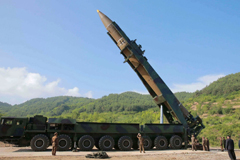 |
In the NewsDecember 21, 2018North Korea warns it will not give up nuclear weapons until US removes 'threat'Nicola SmithThe Telegraph“It has always said this. Some people wanted to delude themselves into believing otherwise. But North Korea is nothing if not consistent,” tweeted Vipin Narang, an associate professor of political science at MIT. |
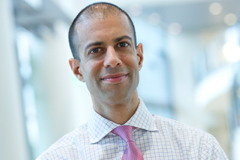 |
In the NewsDecember 21, 2018Narang sees a future with nuclear NorthKim Dong-HyeonKorea JoongAng DailyVipin Narang is a fixture in the American media whenever the issue of North Korea’s denuclearization is discussed. For the first time, Narang answered questions for a Korean media outlet. Excerpts from the interview are featured here. |
 |
In the NewsDecember 21, 2018Posen's "Illiberal Hegemony" among Foreign Affairs' Best of 2018Foreign AffairsBarry Posen's "The Rise of Illiberal Hegemony" article is on Foreign Affairs' The Best of Print 2018 list for best articles they have published this year.
|
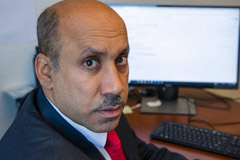 |
In the NewsDecember 11, 2018Khashoggi’s friends, other foreigners, are being watched. The US can do little about itTim Johnson and Stuart LeavenworthMiami Herald“Persons in the United States are legally and effectively protected against unlawful surveillance by American government at every level, but are not legally or effectively protected from surveillance … by foreign governments or persons. Intuitively, this is a peculiar state of affairs,” said Joel Brenner, a former senior counsel at the NSA. |
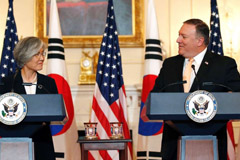 |
In the NewsDecember 7, 2018Trump moving ahead with second Kim summit despite working-level frustrationsConor FinneganABC NewsBut it's not technically a violation of the declaration Trump and Kim signed at the Singapore summit because North Korea "never said it would" disarm, as Vipin Narang, an associate professor of political science at MIT, tweeted Wednesday. |
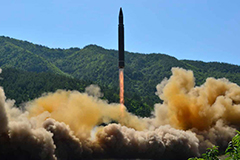 |
In the NewsDecember 5, 2018North Korea: secret missile site revealed in new satellite imagesThe Guardian“North Korea isn’t disarming. It never said it would,” Vipin Narang wrote on Twitter. “[Trump] has to be well aware of these developments. He just doesn’t care. Kim pretends to disarm and Trump pretends to believe him. That’ll get everyone to halftime.” |
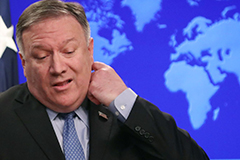 |
In the NewsDecember 4, 2018Russia isn't complying with an arms control treaty--so the US is threatening to rip it upAlex WardVox“Punching out isn’t going to bring them into compliance, and now lets them justify a buildup even more while painting us as the bad guys,” said Vipin Narang, who is quoted in this piece.
|
 |
In the NewsDecember 3, 2018Has Pakistan bought Chinese SH-15 Howitzer for its 'miniaturized' nuclear shells?Nagesh NarayanaInternational Business TimesVipin Narang was quoted as saying, “I should clarify one thing: I have no doubt SPD would love a nuclear artillery shell—it's literally in its DNA—but we are talking about a warhead 1/8th size of Nasr and that's not easy without a test. So I'm very skeptical they have one ... yet.” |
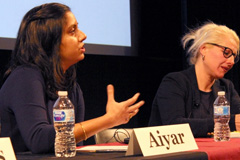 |
In the NewsNovember 29, 2018Populism: a case-by-case studyUna HajdariMIT NewsMIT Starr Forum panel discusses extreme forms of populism that have endangered basic civil liberties and spawned intolerant rhetoric. |
 |
In the NewsNovember 21, 2018A US attempt to keep AI out of China’s hands could actually help ChinaKaren HaoMIT Technology ReviewDavid Edelman, director of MIT’s Project on Technology, the Economy, and National Security, worries that if the restrictions are mishandled, they could cause serious “collateral damage” for US businesses. |
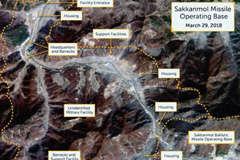 |
In the NewsNovember 13, 2018Satellite images reveal hidden North Korean missile basesZachary CohenCNNVipin Narang told CNN that Kim's actions do not amount to "deception since he said on New Year's Day that North Korea would mass-produce and deploy its missiles that it already tested. There has been no agreement or discussion remotely that detailed --- even on nuclear systems, and many of these are short range conventional missiles which North Korea has never said were on the table." |
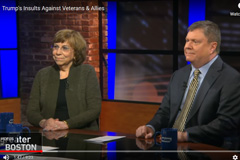 |
In the NewsNovember 13, 2018Insulting veterans and alliesWGBH NewsPresident Trump is getting a lot of criticism for scrapping a planned visit to Arlington National Cemetery in honor of Veterans Day. It's the second time in three days that he has canceled plans to honor US soldiers. |
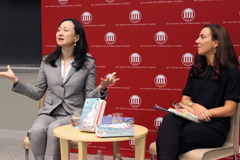 |
In the NewsNovember 1, 2018Novelist Min Jin Lee makes the case for understanding through fictionPeter DizikesMIT NewsRenowned author Min Jin Lee made a vigorous case for literature as an essential means for understanding complex cultures around the globe, during a Starr Forum event. |
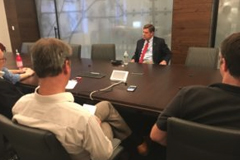 |
In the NewsOctober 17, 2018Endorsement meetings at the Globe ahead of the 2018 midtermsUna Hajdari IWMFWith the mid-terms being around the corner, the Boston Globe editorial board organized meetings with people running for various offices to help decide Globe endorsements, and this year's Neuffer fellow, Una Hajdari, comments on the process. |
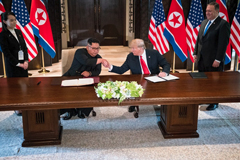 |
In the NewsOctober 12, 2018North Korea weaponizes its deal with Trump to tangle talksChoe Sang-HunThe New York TimesMr. Kim “has mastered the art of milking a single cosmetic concession for months,” Vipin Narang, said on Twitter this week. “Brilliantly selling the same horse twice.” |
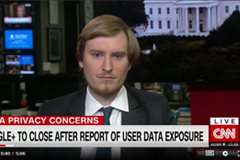 |
In the NewsOctober 10, 2018Google+ to close after report of user data exposureCNNGoogle's unpopular social network is finally finding itself in the spotlight—but for all the wrong reasons. David Edelman speaks with CNN’s News Stream. |
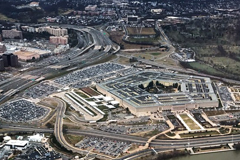 |
In the NewsOctober 10, 2018US weapons systems are easy cyberattack targets, new report findsEmily DreyfussWired“I will say that the GAO can be prone to cyber hyperbole, but unless their sampling or methodology were way off or deliberately misleading, DOD has a very grave problem on its hands,” says R David Edelman. |
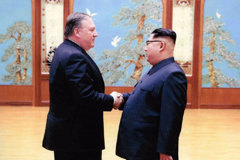 |
In the NewsOctober 9, 2018Pompeo hails 'significant' North Korea progress; experts skepticalReutersThe New York Times“The real takeaway from this Punggye-ri pledge is that Kim has mastered the art of milking a single cosmetic concession for months to burn clock,” Vipin Narang said on Twitter. |
 |
In the NewsOctober 8, 2018Experts dismiss North Korea's latest concession to USAlexander SmithNBC NewsKim and his officials are instead trying to buy time so they can make progress on other fronts…Inviting inspectors to an old testing site is an example of this calculus, according to Vipin Narang. |


